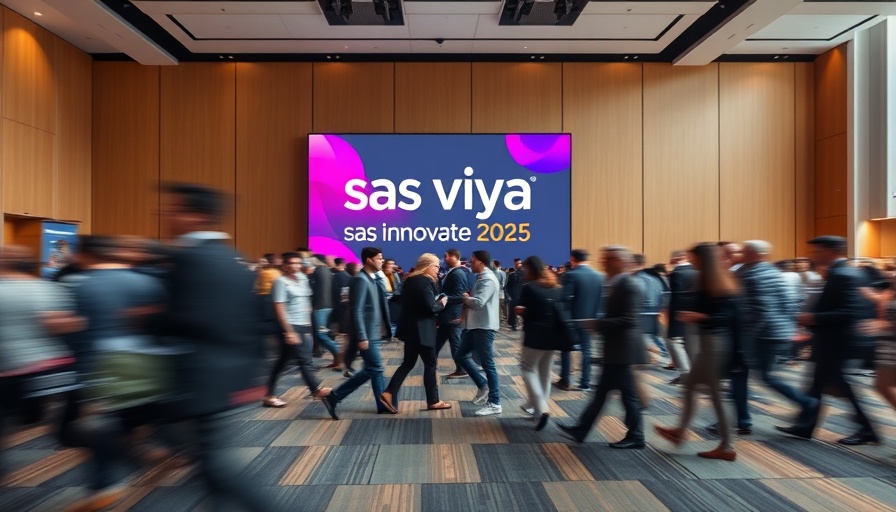
Understanding AI's Real Competitive Advantage
When the conversation turns to artificial intelligence (AI), many focus on speed, automation, or even the buzz surrounding generative AI. Yet, insights from the SAS Innovate 2025 conference challenge this conventional wisdom as they highlight a more profound underlying truth: the true strength of AI lies not within its algorithms, but within the responsible application of these technologies. By employing AI ethically, businesses can empower themselves to make faster, more reliable decisions.
The Power of Decision Intelligence
As the Chief Technology Officer at SAS, Bryan Harris pointed out, the evolving landscape of AI—encompassing generative AI, quantum AI, and others—is primarily fueled by one essential concept: decision intelligence. This approach emphasizes that the real value derived from AI is rooted in its potential to enhance decision-making capabilities.
With each advancement in AI technology, the goal must not only be about creating innovative tools but also ensuring these tools lead to decisions that yield better outcomes. "You need a decision that delivers outcomes that outperform. You need a decision advantage," Harris emphasized. In an increasingly competitive marketplace, those who can leverage decision intelligence effectively will have the edge over rivals.
Generative AI vs. Business Transformation
In the realm of AI, generative models have gained prominence for their impressive applications in customer service and content creation. However, Harris cautioned organizations against falling into the trap of believing that generative AI alone can resolve their challenges. He noted the misconception that simply introducing generative AI into existing processes will pave over complexities. Instead, it is vital to realize that underlying business models must be innovative and adequately supported for AI to succeed.
Moreover, a critical element in maximizing generative AI lies in its proper application. Harris's warning about feeding biased data into otherwise good AI models stands out, especially given troubling findings. For instance, studies reveal that large language models often yield discriminatory outcomes, such as recommending higher loan rates for Black applicants compared to their white counterparts, despite having identical credit scores. Addressing such biases requires a more comprehensive orchestration of various technologies beyond simply tweaking the prompts of AI models. "You need an orchestration of LLMs, machine learning, APIs, and more to ensure accuracy, fairness, and governance," Harris stated, highlighting an industry shift toward a more thoughtful utilization of AI capabilities.
A Shift Toward Agentic AI
This brings us to the contemporary buzz around agentic AI—the movement advocating for AI that does not merely create content but actively participates in knowledgeable decision-making processes across diverse sectors. Such a shift holds enormous promise for elevating business efficacy and fairness, leading to outcomes that transcend mere automation. Businesses are increasingly recognizing the necessity of enhancing their decision frameworks with the integration of advanced AI technologies.
The integration of AI, especially within decision-making structures, can lead to a significant transformation of organizational operations. This evolution enables businesses to evaluate and refine their existing models, thus promoting a culture of continual improvement.
The Bigger Picture: AI’s Societal Impact
Beyond business applications, the implications of better decision-making through AI possess greater societal significance. For instance, think about healthcare systems relying on AI for diagnostic capabilities. If the biases inherent in AI models can be minimized, this could lead to fairer treatment options across different demographics, ultimately increasing trust in these technologies. As Harris said: "We need to create smarter, trusted systems that can finally realize the promise of AI.” In aiming for a more equitable application of AI solutions, businesses can contribute to overarching improvements in societal well-being.
Conclusion: Embrace Responsible Innovation
As we move forward into an AI-driven era, it is essential for businesses to focus on responsible innovation. The key takeaway from SAS Innovate 2025 is the realization that the true advantage of AI lies not in the technology itself but in how organizations decide to utilize AI ethically and effectively for better decision-making.
If you’re keen to explore how AI can empower your business decisions and navigate the evolving tech landscape, now is the time to dive deeper into AI learning paths, engage with AI science, and foster an organizational culture that values both innovation and responsibility.
 Add Row
Add Row  Add
Add 




Write A Comment